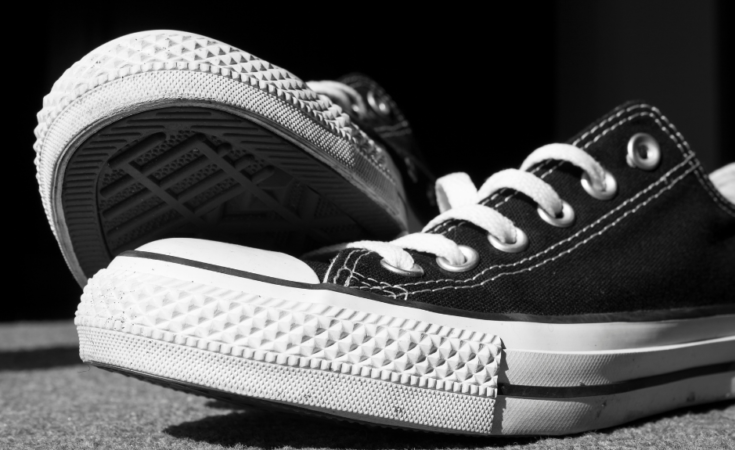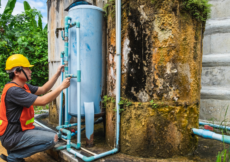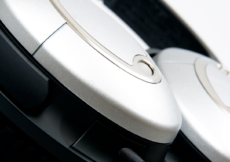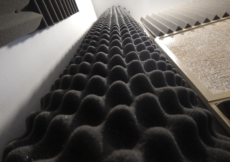You’ve just gone out and bought yourself a new pair of shoes. They look great and fit well, but they won’t stop squeaking! This is a common problem many people have and can lead to unwanted attention when out in public, as well as the impression that your shoes are of bad quality or worn out.
Fortunately, there are ways to fix this annoying issue, without you having to give the shoes up completely and purchase a new pair. We’ll need to look at the different parts of your shoe that could be creating the noise, why they’re doing this, and what the solution to how to stop shoes from squeaking is.
So, whether you’ve got a squeaky pair of sneakers, stilettos, dress shoes or pumps, let’s take a look at the cause of the sound and what you can do to make it stop. Keep reading on to find out more.
What Causes Shoes To Squeak?
There are a number of different causes for shoes that squeak, and no one-size-fits-all answer. Identifying the source of the squeak will help you to take action and fix the problem. Take a look at some of the most common reasons that shoes squeak below.
Surface You Are Walking On
The surface you are walking on can have a big impact on whether your shoe squeaks or not. If you find that your shoe squeaks a lot when you walk on hardwood floors, yet is quiet when walking on carpet, your shoe probably isn’t to blame and you probably aren’t the only one with this issue.
However, if you’re noticing a squeak no matter what type of floor you’re walking on, you shoe might be the cause. Also take a look a look at your sole — but more about this later on.
Size Of Shoe
This seems self explanatory, but always ensure you are wearing the correct size of shoe! Shoe squeaking is likely to occur more if your shoe is too big than too small, as your foot will have extra room to move around inside the shoe which will cause unnecessary noise.
New Shoes
New shoes are one of the biggest generators of the squeaking sound. Shoes that have never been worn before have a smooth sole. While this can not only make you prone to slipping on smooth floors, the lack of friction between the smooth sole and the smooth floor can also be a cause for squeaking.
Fortunately, this problem is usually fixed the more you wear your shoes, as the sole is walked on rougher terrain. The rubber of the sole essentially wears off slightly, so your shoes can grip at surfaces more easily.
Old Shoes
There comes a time when you’ve got to get rid of your old shoes, no matter how comfy they are. Not only do old shoes not support your feet, but they could also be the reason you’re hearing that squeaking noise every time you walk.
The older your shoes are, the more damage they are likely to have sustained, with rips, creases and holes often the cause of the squeaking noise. The sole may come away from the shoe, or the insole may become loose, both of which can generate squeaking.
If your shoe is old, there might not be enough tread on the bottom of your shoe anymore. Like with new shoes, your old shoes might also have a very smooth sole, which can cause squeaking on smooth floors, as there is no friction against the two. This ends up creating a sound, and usually means it’s time to chuck them in the trash.
If you’re really against throwing them away, you could try taking your shoes to a cobbler to see if they can fix them for you and get the pair back to a wearable condition.
The Insoles
Insoles are often the cause of squeaking in shoes, whether the shoes themselves are new or old. Moisture can get trapped underneath the insole (more on this below), and the insole can also rub against other parts of the shoe, resulting in a squeaking sound.
Moisture
Moisture trapped inside the shoe can cause squeaking. Even if you haven’t been for a dip in the sea wearing your shoes, simply walking in the rain or stepping in a puddle can leave water trapped in your shoes for months if they are not completely dried. Sweat and moisture from your feet everyday can also build up in the shoe, especially if you don’t leave them to air properly before you put them on next, all which can contribute to a squeaking noise.
You’re Going Barefoot
If wearing socks doesn’t compliment your outfit, you might be tempted to go barefoot. But if you’re experiencing a squeaking noise, not wearing any socks could actually be the cause. Feet can get sweaty when you’re walking around, and socks can help to soak up this sweat. Without them, your feet could slide around inside the shoe and make an unpleasant sound.
Socks also help cushion the friction between your foot and your shoe and add an extra layer of protection between the two. They can dampen the noise of any squeak your shoe might be making, too, so, if you’re experiencing a squeak, grab a pair of socks out of your drawer.
Common Shoe Squeaks
Certain types of shoes are more prone to squeaking than others. Take a look below at the most common squeaking shoes and see whether you shoes fall into any of these categories.
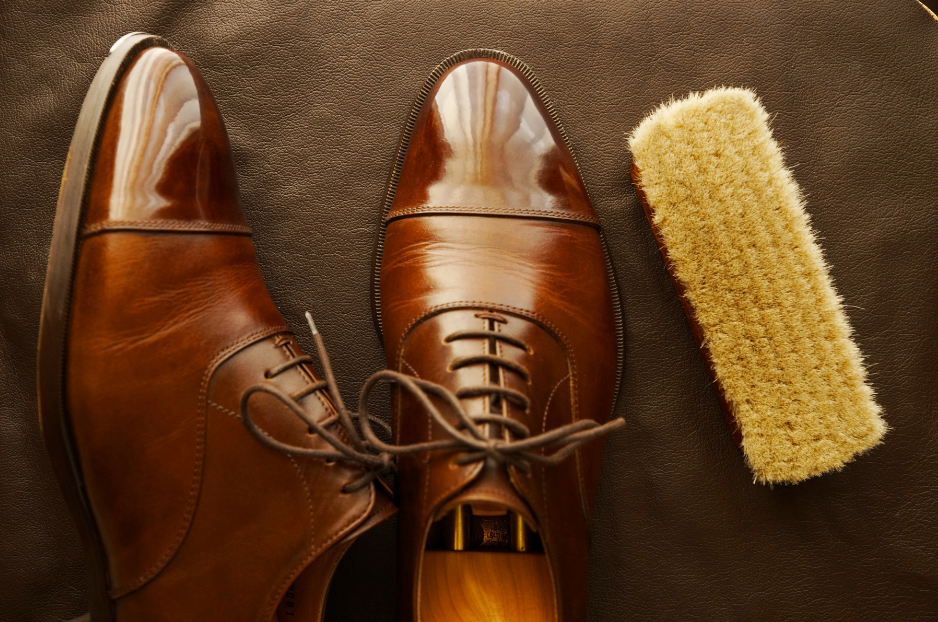
Leather Shoes
Leather shoes often squeak when they haven’t been cared for properly. You should always ensure you keep your leather shoes in a box, away from any moisture or heat. They should also be kept somewhere there is good ventilation.
Leather shoes should also be kept moisturized. You can use a saddle soap, a leather conditioner or a conditioning oil to moisturize the outside of your leather shoes and to help prevent them from squeaking.
Sneakers
Sneakers are another type of shoe that often squeak, mainly because they are made of rubber. You are much more likely to hear squeaks in your sneakers if the shoes are damaged or the soles are too smooth from overuse. Shoes with rubber soles often squeak along smooth floors, too. You may also hear squeaking from the insole of the shoe, or from the tongue of the shoe rubbing against other parts of the shoe.
Shoes With Orthotics
If your shoes have any kind of inserts, they could be the cause of the squeaking sound you are hearing. Not only can moisture get trapped underneath the orthotics and create the unpleasant noise, but these inserts can also rub against the existing insoles of the shoes and generate a sound. Fortunately, there are ways to fix squeaking noises caused by orthotics without having to remove them.
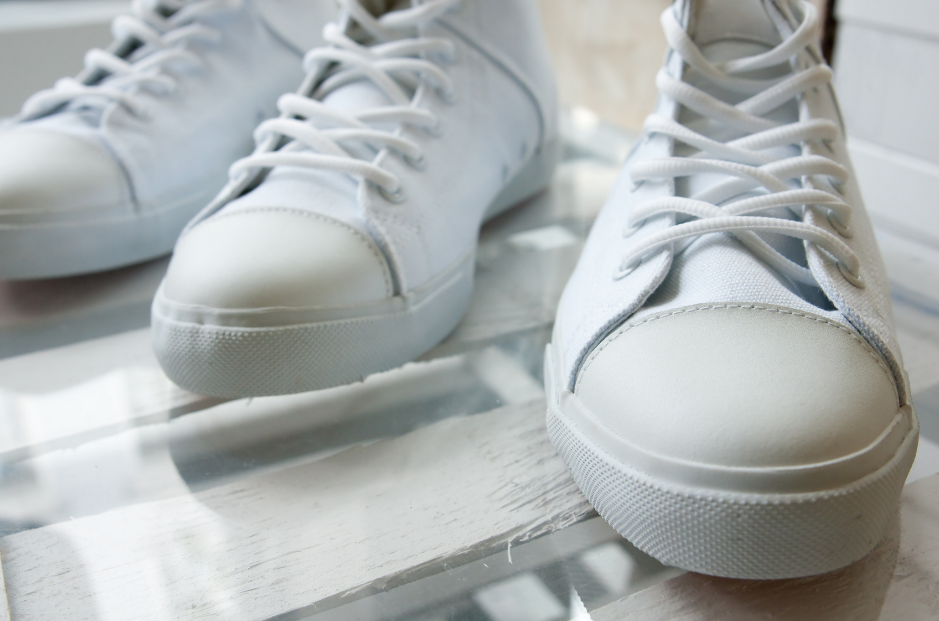
How To Identify Why Your Shoe Is Squeaking
To help fix the problem of squeaks in your shoes, it is helpful to know where the squeak is coming from in the first place. The best way to do this is to walk around the room, and rock your feet from heel to toe, and then from side to side. From this, you should be able to determine which part of the shoe is making the noise. If you have someone else around you, you can ask them to put their ear close to your shoe and help you to figure out which part of the shoe the noise is coming from.
Once you know why your shoe is squeaking, you can try to fix it! Keep reading on to find out how to stop shoes from squeaking.
How To Fix Squeaks In Your Shoes
Below we have listed some of the best ways to go about fixing squeaks in your shoes. We have broken these solutions down into parts of the shoe, so you can find your answer more quickly.
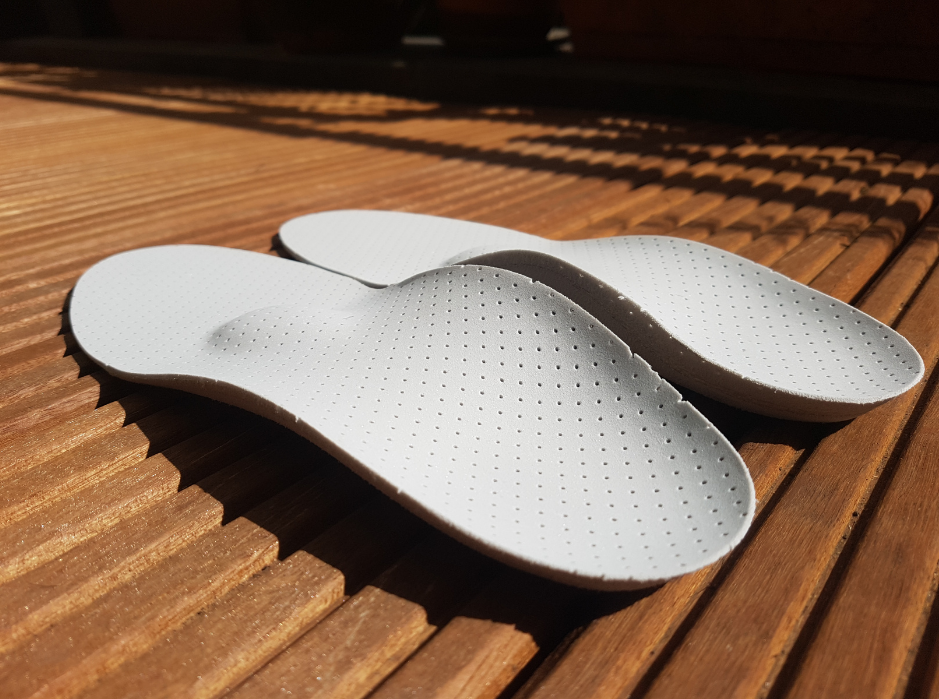
How To Fix Squeaks Cause By The Insole
Use Baby Powder
Moisture can get trapped between the inner sole and the midsole of your shoe and generate a squeaky noise. One of the easiest ways to get rid of this noise is to remove the insole and sprinkle baby powder underneath it before replacing the insole. The baby powder will absorb the moisture and stop shoes squeaking.
Any brand of baby powder or talcum powder will work, as will cornstarch. Baby powder can be a little unsightly because it is white, so try using it the night before you need to wear the shoes. This will give enough time for the powder to absorb any moisture, and then you can buff away any excess with a washcloth in the morning.
Baby powder can also be used between the tongue and the upper, or between the base and the upper if this is where you are hearing the squeaky sound. You can use a paintbrush to ensure it really gets into the crevices. It also doesn’t matter if you don’t have removable insoles — you can work the powder into the insole itself, focusing on the edges.
Ensure you don’t use too much powder, because this can cause clumps. These then may stick to your socks or generate another squeaking noise, which is definitely not what you want!
Use Coconut Oil
Coconut oil can be used on the insoles of your shoes in much the same way that baby powder can be. You should remove the insoles and place a thin layer of coconut oil underneath, which will help to reduce the friction and the squeak. Coconut oil also leaves a nice smell and it has antimicrobial properties, so can combat foot odor.
if you don’t have any coconut oil, you can use petroleum jelly instead. You will need to reapply both coconut oil and petroleum jelly every time your shoe begins to squeak again.
Use Paper Towels
If you’ve tried baby powder or want a less messy way to reduce moisture and friction in your shoes, you can use paper towels. Paper towels are particularly useful if you wear orthotics, as there is no risk of damaging them.
Use a high-quality paper towel (cheap ones don’t absorb as much water) and fold it until it forms a long rectangle. You can then place this underneath the insole. If it doesn’t fit, cut it to size, and if you need more, you can double up on the towels.
Newspaper and dryer sheets also work well if you don’t have any paper towels. Remember to replace any towels, sheets or paper you put inside your shoe from time to time to stop them smelling.
Put Them In The Dryer
If you have tried the three options above for removing moisture underneath the insole and have had no luck, try putting your shoes in the tumble dryer to get rid of nay excess moisture. Place some fabric softener on a washcloth and put it in the dryer with your shoes.
Always ensure you don’t put your shoes in the dryer for any more than ten minutes, as this could end up damaging the shoe. You will also want to put the dryer on a low heat setting.
If you don’t have a tumble dryer, putting shoes on the radiator or using a hair dryer on them works well, too. If the insole of the shoe isn’t glued down, you could take it out to help the shoe dry quicker.
Placing your shoes in the sun works too, but ensure you don’t leave them out for too long as this can cause discoloration.
Use Glue
If your insole has come away from the midsole inside of the shoe, it could be making a squeaking noise as it slides against it. To fix this, you can glue the insole down. Do this by removing the entire insole carefully, and placing superglue along it before sticking it back down. You may have some trouble getting the insole out, so unlace the shoe entirely and pull the tongue back to get better access.
How to Fix Squeaks Caused By The Outsole
Use Friction
New shoes often squeak against smooth floors because the sole of the shoe is also smooth. You may want to roughen up the sole a little so there is more friction between your sole and the floor. You can do this by rubbing a dryer sheet along the bottom of your shoe a couple of times a week until the problem is fixed.
If you would prefer a quicker fix, you could use sandpaper against the outer sole of your shoe, too. Use 120-220 grit sandpaper and be gentle as to not damage the shoes. Rubber cement also works well on the bottom of squeaky shoes.
Fix Broken Sole
If your shoe is old or of bad quality, the sole may be broken or coming away from the rest of the shoe which can cause squeaking. A cobbler can help you to fix this, or you can do it from home. Use superglue to reattach any loose parts, and hold the shoe in place with rubber bands. Always make sure the superglue is dry before you try to wear the shoes outside again.
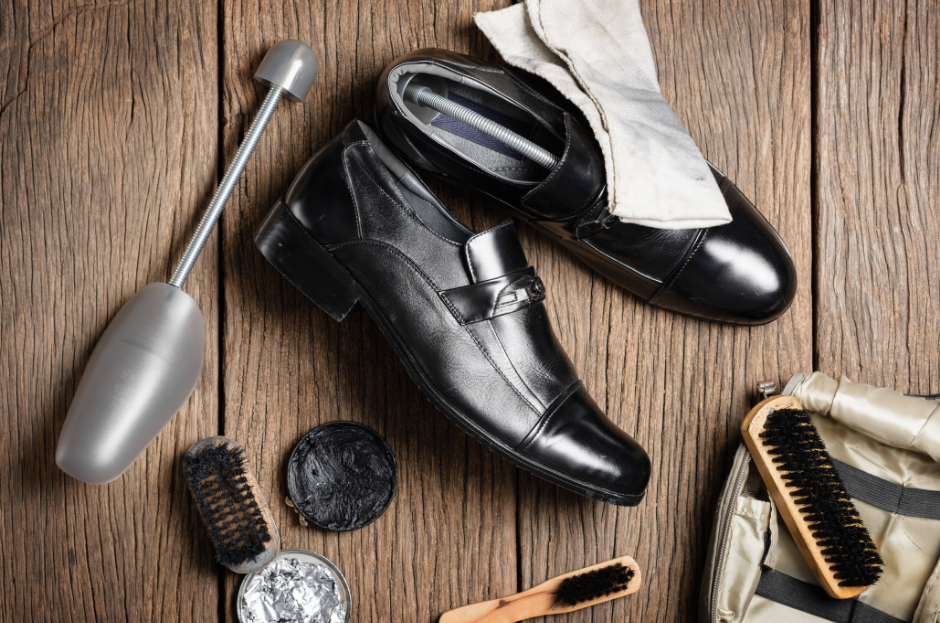
How To Fix Squeaks Caused By The Outer Body
Use WD-40
WD-40 is very useful, particularly at stopping squeaks and creaks around your house. You can spray this on door and cupboard hinges to stop noises. But did you know you can also use it on your shoes to stop squeaking?
You should squirt some WD-40 onto a cotton ball and rub it over the outsole of your shoe. You can also rub it on the upper, but only if your shoe is made of synthetic material. You should never use WD-40 on genuine leather because it will ruin it.
Use Conditioner Or Saddle Soap
The tongue of the shoe can often be to blame for any squeaking noise you might hear, because it can rub against the rest of the upper. You can use conditioner or saddle soap to moisturize the tongue of the shoe and help to soften it.
You should always use the correct type of conditioner for the material of your shoe. If you are unsure, consult a professional. You will also have to repeat this process because the conditioning will fade over time.
Use DIY Oil
Fixing the squeak in your shoes doesn’t mean you have to go out and buy special chemicals. You can put together your own oil spray to spray on your shoes to condition them and hopefully stop the squeaking.
Mix three parts of olive oil and one part water in a spray bottle and spray onto the shoes, then massage it in. You could also use 90% vegetable oil with 10% of an ingredient called acetone, which is something found in nail polish remover. However, you shouldn’t use nail polish remover on your shoes.
Use Liquid Silicone
If you don’t want to use WD-40 on your shoes, liquid silicone can also help to fix your squeaky shoes without the risk of damaging them. Silicone also helps to repel water, which can help protect your shoes from future damage.
Spray the silicone onto the shoe sparingly, aiming it at the areas which squeak. Always let the shoes dry before you wear them again and make sure to spray in a well-ventilated area.
How To Fix Squeaks Caused By Other Factors
Put On An Extra Pair Of Socks
If your shoes are a little too big and this is the cause of the squeak, you might not want to go out and buy another pair. Try wearing an extra pair of socks or use insoles to make the shoe fit more snug against your foot to help reduce the noise.
Shoelaces
If the squeaking in your shoes is caused by shoelaces rubbing against the outer part of the shoe, try using saddle soap underneath the laces to help moisturize the shoe and stop the noise.
Break-In Your Shoes
This can be frustrating, but often new shoes just squeak! New shoes need to be broken in — in other words, they need to get used to your feet. This is particularly true of leather shoes, which you can break in by wearing with socks around the house. You can also spray your shoes with water and wear them until they are dry, which will help the shoes to mold themselves to your feet.
Once they have slightly molded themselves to your feet, not only will your new shoes feel more comfortable, but they will most likely squeak less, too. You’ll also find that over time, the soles wear down and give you more traction, which means after a while, if the sole is the cause of the noise, it should go away.
Use Candle Wax On Buckles
Some shoes have a buckle on them, particularly leather shoes, and if this buckle rubs against the leather, it can make a squeaking noise. To deal with this, you can use candle wax on the buckles, or beeswax, which will help to reduce abrasion. Rub wax along the buckles, paying close attention to the part where the buckle meets the leather.
Purchase A Spare Pair Of Shoes
If your feet get very sweaty everyday (ie. you’re wearing your sneakers to the gym), you may want to purchase an extra set of shoes. This will allow you to swap out your shoes from day to day and gives the pair you are not wearing a chance to air. This will help to dry the shoes out. You could also use this method alongside using baby powder or paper towels, so you are extra sure the pair is dry.
Use Foam
If you have detected the part of the shoe that is squeaking but can’t seem to find a solution, you may find that sticking some foam to the area that squeaks helps. Not only does this add extra cushioning so your foot is rubbing against this part of the shoe, but the foam will also help to absorb the noise of the squeak.
How To Stop Shoes From Squeaking: FAQs
What do squeaky shoes mean?
Squeaky shoes can mean a number of things. The most common reasons your shoes are squeaking are:
- Your shoes are old and need replacing
- Your shoes are new
- There is moisture trapped in your shoes
- Your shoes are the wrong size
- Your shoes are dry and need to be conditioned
- The sole of your shoe is coming away from the upper
Do shoe squeaks mean I need a new pair of shoes?
Not necessarily! Shoe squeaks can be caused by many different factors, and you may even find a brand new pair of shoes squeak. The age of your shoes may not play any role in the sound they make, and the squeak could be caused by trapped moisture or a dry upper.
However, if your shoes are very old or falling apart, this may be the cause of the squeak. Replacing them will get rid of the squeaking sound, while also helping to support your foot more!
My shoes are new. Why do they squeak?
New shoes often squeak because they have not been worn in yet. This is the same reason new shoes can often be painful to wear until they have had time to mold to your feet. If you think this may be the cause for your squeaking shoes, wear your new shoes with socks around the house to help wear them in. You could also spritz them with water and wear them until they are dry, so they dry molded to your feet.
Should I take my squeaky shoes to a professional?
If you’ve tried everything to stop your shoes from squeaking but you’re still unsure what the cause is, or know where the sound is coming from but can’t seem to fix it, you may want to take your squeaky shoes to a shoe repair professional.
A cobbler should be able to help you by identifying where the noise is coming from and whether it is fixable. Sometimes, the problem is caused by the manufacturing, and in these cases professional might not be able to do anything. In this case, you may want to return your shoes to the manufacturer and get a new pair.
However, if your shoes are old or broken and this is causing the squeak, your favorite pair could last a lot longer if you take them to a cobbler, even if you think they are beyond repair.

